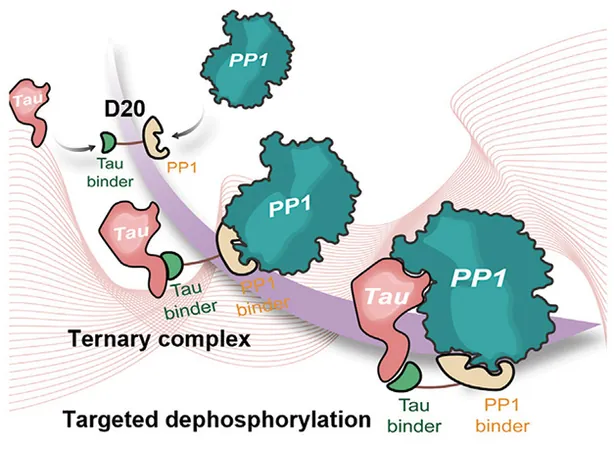
Breakthrough Chimeric Protein Reverses Tau Pathology and Restores Memory in Mice - Is This the Key to Alzheimer's Treatment?
2024-10-06
Author: Daniel
Breakthrough in Tau-Related Diseases
In an exciting development in the battle against tau-related diseases, a team of researchers from Huazhong University of Science and Technology, led by Jian-Zhi Wang, has unveiled a novel chimeric protein, designated D20. This innovative protein selectively targets tau, a key protein implicated in neurodegenerative disorders like Alzheimer's disease, by recruiting Protein Phosphatase 1 (PP1) to effectively dephosphorylate it.
Significance of the Study
Published in Cell Chemical Biology, this study has significant implications for future drug development. Tau pathology is notorious for its role in Alzheimer's and other tauopathies, and researchers have struggled to find effective treatments. Conventional methods often result in off-target effects due to the complex nature of tau and similar proteins. However, the D20 chimeric protein presents a targeted approach, minimizing these side effects.
Research Findings
The research demonstrated that in two mouse models of tauopathy, administration of D20 successfully reduced both phosphorylated tau (p-tau) and total tau levels in the brain. Remarkably, chronic treatment with D20 restored synaptic density and improved memory function to levels comparable to healthy mice. This breakthrough highlights a promising new strategy for addressing tau-related brain impairments.
Optimizing D20
Linyu Wei and Yue Xiao, co-first authors of the study, optimized D20 based on previous attempts with other dephosphorylation-targeting chimeras, known as DEPTACs. These involve linking a tau-binding motif with a phosphatase-recruiting domain, ultimately delivering PP1 precisely to tau. Their earlier DEPTAC using protein phosphatase 2A was effective at high doses. In contrast, the newly designed D20 is not only more effective but operates at a significantly lower dose, making it more feasible for therapeutic use.
Potency of D20
In laboratory experiments with rat neurons, D20 was shown to virtually eliminate phosphorylation at crucial tau sites in under six hours, demonstrating its potency. In P301L tauopathy mice, a single dose of D20 reduced p-tau and total tau levels by up to 50% within 24 hours.
Chronic Treatment Success
Moreover, in a chronic dosing regimen using 3xTg mice—which carry the P301L tau variant and mutations promoting amyloid plaque formation—D20 treatment every other day for 20 days resulted in striking improvements. The levels of p-tau were diminished by up to 75%, and total tau levels returned to those seen in healthy control mice. Notably, the treated mice passed several memory tests, such as recalling foot shocks and navigating the Morris water maze, indicating a full restoration of memory capabilities without any signs of toxicity to the liver, kidneys, or heart.
Limitations and Future Directions
Despite these successes, the authors noted D20's lack of efficacy in a third mouse model expressing a neurotoxic tau fragment, underscoring the complexity of tauopathies. This suggests the need for personalized therapeutic strategies rather than a one-size-fits-all approach in treating such intricate neurological disorders.
Conclusion
This groundbreaking discovery opens the door to new avenues in Alzheimer's treatment. If successful in further trials, the D20 chimeric protein could represent a paradigm shift in how we approach tauopathies, providing hope to millions affected by neurodegenerative diseases. Stay tuned for more updates as these pioneering research efforts continue!


 Brasil (PT)
Brasil (PT)
 Canada (EN)
Canada (EN)
 Chile (ES)
Chile (ES)
 España (ES)
España (ES)
 France (FR)
France (FR)
 Hong Kong (EN)
Hong Kong (EN)
 Italia (IT)
Italia (IT)
 日本 (JA)
日本 (JA)
 Magyarország (HU)
Magyarország (HU)
 Norge (NO)
Norge (NO)
 Polska (PL)
Polska (PL)
 Schweiz (DE)
Schweiz (DE)
 Singapore (EN)
Singapore (EN)
 Sverige (SV)
Sverige (SV)
 Suomi (FI)
Suomi (FI)
 Türkiye (TR)
Türkiye (TR)